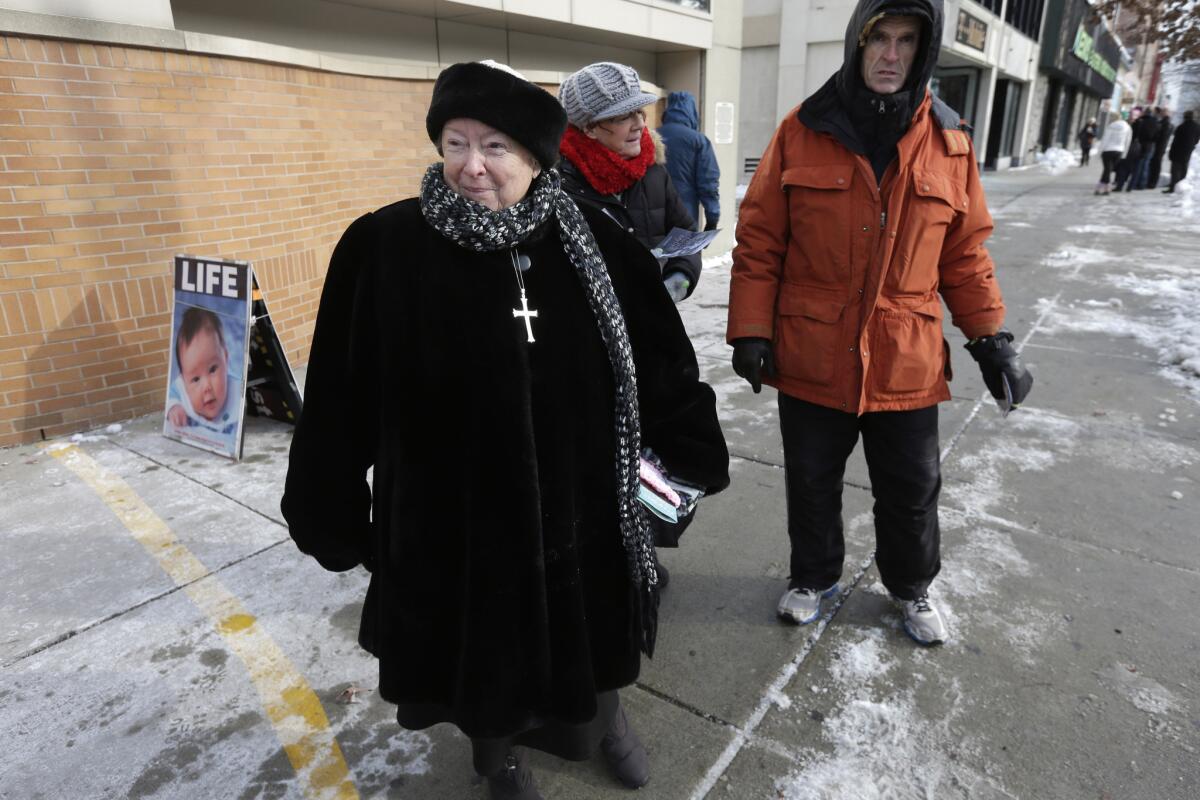Gentle protester wants court to end abortion clinic buffer zones: No!

On Wednesday, the Supreme Court is due to hear arguments on the constitutionality of a Massachusetts law that requires antiabortion protesters to stay 35 feet from abortion clinic entrances.
If any group in America is going to be tormented by this conflict between free speech and abortion rights, it’s the country’s oldest civil rights organization.
And yet, as usual, the American Civil Liberties Union gets it right.
The buffer zone law is legal, says the ACLU. On its face, it neither prevents nor suppresses political expression, but rather finds a healthy balance between two seemingly irreconcilable rights. In its friend-of-the-court brief, filed in support of neither side (!), the ACLU also says the law needs some refinements, best achieved by a lower court.
The plaintiff in the case, Eleanor McCullen, is a wealthy, 77-year-old suburban Boston grandmother and lifelong Catholic who approaches pregnant women gently and offers to have baby showers for them if they change their minds and see their pregnancies to term.
McCullen claims she has been able to talk many women out of abortions, which, in my humble opinion, undermines her argument that she can’t be an effective advocate for her political views from outside the buffer zone. (The zone, by the way, also applies to abortion rights advocates.)
As gentle as McCullen may be, letting her get closer to the clinics opens the door to trouble.
Massachusetts first tried to address the abortion clinic harassment problem in 2000, when it created a “floating buffer zone” that was supposed to create a six-foot bubble around patients and staff as they entered and exited clinics. According to the ACLU’s friend-of-the-court brief in the McCullen case, the law was a response to a litany of violence and harassment,
“ … including the blockading of entrances, the intimidation of staff and patients, and the murder of two clinic employees. Employees and volunteers at Massachusetts clinics testified at legislative hearings that antiabortion protesters impeded access to the clinics by blocking entrances and surrounding arriving cars, intimidated and harassed arriving patients, and even assaulted patients and staff. One witness described how ‘patients and their escorts are subjected to a barrage of harassment, usually verbal and sometimes physical,’ and reported an incident at one clinic where ‘three protesters stood across the entrance with less than one foot between them. [A clinic employee] was forced to squeeze between them to gain entrance to the clinic.’ Another clinic staff member testified that a protester pushed her into a moving car driving into the clinic’s garage entrance.”
Unfortunately, the ACLU said in its brief, the floating buffer zone was a failure:
“The evidence showed that protesters continued to crowd entrances to clinics, impede access and harass clinic patients and staff, despite the 2000 law. Witnesses testified that the floating buffer zone was ‘vague’ and ‘difficult to enforce,’ resulting in frequent violations of the law but few arrests and prosecutions. An employee of one clinic testified that since enactment of the floating buffer zone statute, ‘[t]he protesters are moving closer and closer to the main door [of the clinic]. They scream and block the way for the patients to get into the clinic .... ’ A Boston police captain testified that the floating buffer zone statute was ‘very difficult for us to enforce’ and that protesters continued to stand directly in front of the clinic door and ‘a lot of them go right up in the faces of of patients entering the premises.’ ”
The 2009 law, creating a fixed 35-foot zone around clinic entrances, has been a good compromise. “Reconciling those rights,” said ACLU legal director Steven R. Shapiro, “has been an admittedly difficult task.”
Absolutists who think that a buffer zone is an impermissible infringement on free speech need to be reminded of the mayhem wrought by antiabortion extremists over the last two decades. The battle over abortion rights is unique in our country, and the litany of violence inflicted by abortion foes must not be erased from public memory, nor excused as an aberration.
That is not to say that most abortion foes are dangerous, or prone to outbursts or that, like Eleanor McCullen, they should ever be prohibited from expressing their deep and sincerely held beliefs.
It just means that her right to express her opinion should never trump another woman’s right to enter a medical clinic in relative peace.
ALSO:
Stop whining, Christie conservatives
Transgender students ‘looking for their place in the world’
Twitter: @robinabcarian[email protected]
More to Read
Sign up for Essential California
The most important California stories and recommendations in your inbox every morning.
You may occasionally receive promotional content from the Los Angeles Times.











